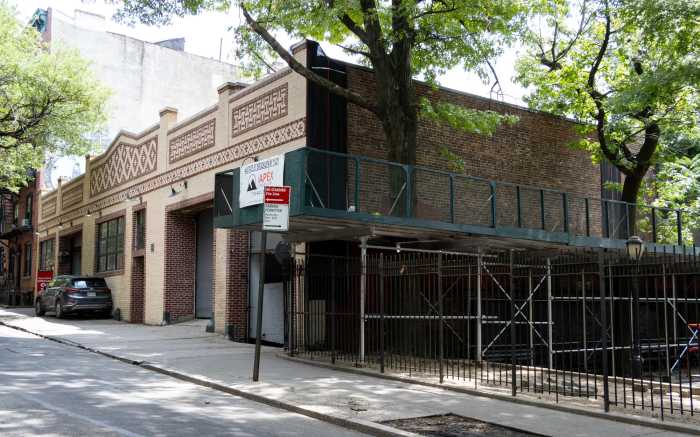Has Councilman Bill DeBlasio sold out his district in one of his last official acts before becoming public advocate?
That’s what many Carroll Gardens residents are charging, days after their Democratic councilman slipped an amendment into a Council bill that would exempt a well-connected private school — and only that private school — from long-established zoning that protects the front yards of Carroll Gardens.
The amendment would allow Hannah Senesh School, which is on Smith Street between First and Second places, to move ahead with a plan for the additional classrooms on the side lot on First Place, which is currently used as for parking.
It may sound like a simple transfer of land, but that Hannah Senesh side lot is not just a parking lot, but an architectural feature that is fundamental to the neighborhood — indeed, such lots are what give Carroll Gardens its name. And many fear that DeBlasio’s exception — slipped into a bill protecting all the other lots on First through Fourth places — will set a dangerous precedent.
“There is no other set-up like this in New York City,” said Rita Miller, a member of the Carroll Gardens Coalition for Respectful Development. “Allowing construction on these gardens takes away from the character of the neighborhood. Make one exemption and others are likely to follow.”
DeBlasio, who will become the city’s second-highest elected official on Jan. 1, sought to calm the furor.
“This proposal to explore expanding a school into this paved parking lot does not undermine the significant gains we have made over the past several years in protecting our neighborhood,” he said in a statement.
DeBlasio was referring to his leadership last year in protecting such front gardens by getting the city to classify the blocks in question as “narrow” streets — and therefore off-limits to development.
The dispute is rooted in Cobble Hill’s early days in the mid-1800s. At that time, surveyor Richard Butts preserved many area courtyards by mapping them as street, rather than part of the homeowner’s property. By doing this, the designer sought — at least from locals’ perspective — to preserve a certain quaint aesthetic.
Another local, John Hathaway, said that if DeBlasio’s proposal passed, the mapmaker’s vision could be irreparably damaged.
Stoking the anger is the fact that Hannah Senesh brass — which could not be reached for comment — hired the well-connected former Councilman Ken Fisher to lobby the city to transfer ownership of the courtyard.
It also didn’t look good that DeBlasio received $675 in campaign contributions earlier this year from Lisa Kleinman, a member of the school’s board of directors.
The vice chair of the board sought to downplay the controversy surrounding the proposed amendment.
“We’re members of the Carroll Gardens community,” said Amy Glosser. “We recognize the importance of the symbiotic relationship with the neighborhood, and look forward to working with the community.”
Glosser added that an additional facility is important to the two-year-old school.
“We realize we need room for a full-sized gym, a computer room, or a theater,” she said. “We certainly need more classrooms. This is not about growing the school, it’s about better meeting programmatic needs.”
For now, DeBlasio’s amendment has a long way to go before being signed into law. First, it must pass a Council committee, then the full Council, before getting a mayoral signature.
Then, the school would have to begin the normal land-use review process that kicks in whenever a landowner wants to change zoning.
The Hannah Senesh controversy is just the latest in as many weeks for the area. Last week, Norah Jones’s Cobble Hill neighbors were outraged after the singer was given permission to punch 10 windows into the wall of her Amity Street home, despite its location within the historic district.
The school will discuss its expansion plan tonight, Dec. 7, at Hannah Senesh Community Day School [342 Smith St. between First and Second places, (718) 858-8663] at 6 pm.

























